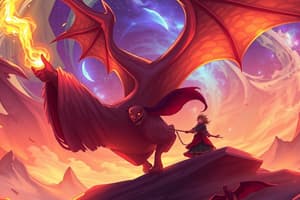Podcast
Questions and Answers
Which scientist developed the theory of relativity?
Which scientist developed the theory of relativity?
- Albert Einstein (correct)
- Julius Caesar
- Napoleon Bonaparte
- Martin Luther King Jr.
What major era in history was characterized by feudalism, the Crusades, and the rise of Christianity?
What major era in history was characterized by feudalism, the Crusades, and the rise of Christianity?
- Ancient Era
- Modern Era
- Medieval Era (correct)
- Early Modern Era
What is the arrangement of elements by atomic number and properties called?
What is the arrangement of elements by atomic number and properties called?
- Chemical Bonding
- Cell Theory
- Human Body Systems
- Periodic Table (correct)
What is the term for the process by which living organisms are composed of cells?
What is the term for the process by which living organisms are composed of cells?
What is the process of change in species over time through natural selection called?
What is the process of change in species over time through natural selection called?
What is the term for the process of changing the computer's instructions or data?
What is the term for the process of changing the computer's instructions or data?
What is the term for the process of storing data remotely?
What is the term for the process of storing data remotely?
Who wrote the Pulitzer Prize-winning novel 'To Kill a Mockingbird'?
Who wrote the Pulitzer Prize-winning novel 'To Kill a Mockingbird'?
What literary movement focused on everyday life, social issues, and accuracy?
What literary movement focused on everyday life, social issues, and accuracy?
Which ancient Greek epic poems are attributed to Homer?
Which ancient Greek epic poems are attributed to Homer?
Flashcards are hidden until you start studying
Study Notes
History
- Major Eras:
- Ancient Era (3000 BCE - 500 CE): civilizations like Egypt, Greece, and Rome
- Medieval Era (500 - 1500 CE): feudalism, Crusades, and the rise of Christianity
- Early Modern Era (1500 - 1800 CE): Renaissance, Enlightenment, and colonization
- Modern Era (1800 - 2000 CE): industrialization, World Wars, and globalization
- Notable Events:
- World War I (1914-1918): triggered by the assassination of Archduke Franz Ferdinand
- World War II (1939-1945): Axis powers (Germany, Italy, Japan) vs. Allied powers (US, UK, USSR)
- French Revolution (1789-1799): overthrow of the monarchy and establishment of the First Republic
- American Revolution (1765-1783): colonies' independence from British rule
- Famous Figures:
- Julius Caesar: Roman general and statesman
- Napoleon Bonaparte: French military leader and emperor
- Albert Einstein: physicist and developer of the theory of relativity
- Martin Luther King Jr.: American civil rights leader
Science
- Biology:
- Cell Theory: cells are the basic units of life, and all living organisms are composed of cells
- Evolution: process of change in species over time through natural selection
- Human Body Systems: skeletal, muscular, circulatory, respiratory, and nervous systems
- Chemistry:
- Periodic Table: arrangement of elements by atomic number and properties
- Chemical Bonding: ionic, covalent, and metallic bonds
- Acids and Bases: pH levels, strong and weak acids, and strong and weak bases
- Physics:
- Laws of Motion: Newton's laws of inertia, acceleration, and action-reaction
- Energy and Work: kinetic energy, potential energy, and the conservation of energy
- Electricity and Magnetism: electric circuits, resistance, and electromagnetic induction
Technology
- Computer Science:
- Hardware: central processing unit (CPU), memory, and input/output devices
- Software: operating systems, programming languages, and applications
- Internet: World Wide Web, HTTP, and IP addresses
- Communications:
- Telecommunications: telephone, radio, and television
- Networking: LAN, WAN, and Wi-Fi
- Data Storage: hard drives, solid-state drives, and cloud storage
- Robotics and Artificial Intelligence:
- Machine Learning: supervised, unsupervised, and reinforcement learning
- Natural Language Processing: language recognition, generation, and translation
- Computer Vision: image recognition, object detection, and facial recognition
Literature
- Major Literary Movements:
- Romanticism (18th-19th centuries): emphasis on emotion, nature, and individualism
- Realism (19th-20th centuries): focus on everyday life, social issues, and accuracy
- Modernism (20th century): experimentation with form, language, and narrative structure
- Notable Authors:
- William Shakespeare: English playwright and poet
- Jane Austen: English novelist and social commentator
- Charles Dickens: English novelist and social critic
- Toni Morrison: American novelist and Nobel laureate
- Famous Works:
- The Iliad and The Odyssey (Homer): ancient Greek epic poems
- To Kill a Mockingbird (Harper Lee): Pulitzer Prize-winning novel on racial injustice
- The Great Gatsby (F. Scott Fitzgerald): novel on the American Dream and the Roaring Twenties
Geography
- Continents:
- 7 continents: Africa, Antarctica, Asia, Australia, Europe, North America, and South America
- Oceans:
- 5 oceans: Pacific, Atlantic, Indian, Arctic, and Southern
- Mountains and Rivers:
- Himalayan Mountains: highest mountain range in Asia
- Mount Everest: highest peak in the world
- Amazon River: longest river in South America
- Nile River: longest river in Africa
- Countries and Capitals:
- United States: Washington, D.C.
- China: Beijing
- India: New Delhi
- Japan: Tokyo
Studying That Suits You
Use AI to generate personalized quizzes and flashcards to suit your learning preferences.




